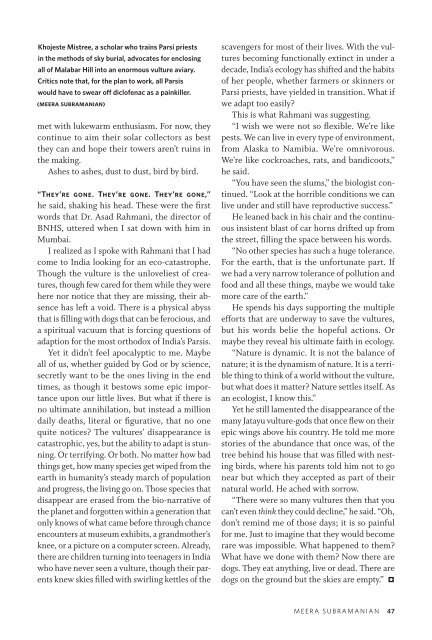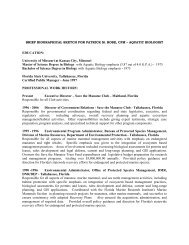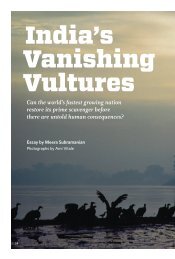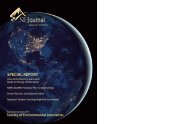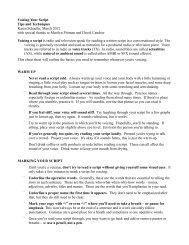Create successful ePaper yourself
Turn your PDF publications into a flip-book with our unique Google optimized e-Paper software.
Khojeste Mistree, a scholar who trains Parsi priests<br />
in the methods of sky burial, advocates for enclosing<br />
all of Malabar Hill into an enormous vulture aviary.<br />
Critics note that, for the plan to work, all Parsis<br />
would have to swear off diclofenac as a painkiller.<br />
(meera subramanian)<br />
met with lukewarm enthusiasm. For now, they<br />
continue to aim their solar collectors as best<br />
they can and hope their towers aren’t ruins in<br />
the making.<br />
Ashes to ashes, dust to dust, bird by bird.<br />
“They’re gone. They’re gone. They’re gone,”<br />
he said, shaking his head. These were the first<br />
words that Dr. Asad Rahmani, the director of<br />
BNHS, uttered when I sat down with him in<br />
Mumbai.<br />
I realized as I spoke with Rahmani that I had<br />
come to India looking for an eco-catastrophe.<br />
Though the vulture is the unloveliest of creatures,<br />
though few cared for them while they were<br />
here nor notice that they are missing, their absence<br />
has left a void. There is a physical abyss<br />
that is filling with dogs that can be ferocious, and<br />
a spiritual vacuum that is forcing questions of<br />
adaption for the most orthodox of <strong>India’s</strong> Parsis.<br />
Yet it didn’t feel apocalyptic to me. Maybe<br />
all of us, whether guided by God or by science,<br />
secretly want to be the ones living in the end<br />
times, as though it bestows some epic importance<br />
upon our little lives. But what if there is<br />
no ultimate annihilation, but instead a million<br />
daily deaths, literal or figurative, that no one<br />
quite notices? The vultures’ disappearance is<br />
catastrophic, yes, but the ability to adapt is stunning.<br />
Or terrifying. Or both. No matter how bad<br />
things get, how many species get wiped from the<br />
earth in humanity’s steady march of population<br />
and progress, the living go on. Those species that<br />
disappear are erased from the bio-narrative of<br />
the planet and forgotten within a generation that<br />
only knows of what came before through chance<br />
encounters at museum exhibits, a grandmother’s<br />
knee, or a picture on a computer screen. Already,<br />
there are children turning into teenagers in India<br />
who have never seen a vulture, though their parents<br />
knew skies filled with swirling kettles of the<br />
scavengers for most of their lives. With the vultures<br />
becoming functionally extinct in under a<br />
decade, <strong>India’s</strong> ecology has shifted and the habits<br />
of her people, whether farmers or skinners or<br />
Parsi priests, have yielded in transition. What if<br />
we adapt too easily?<br />
This is what Rahmani was suggesting.<br />
“I wish we were not so flexible. We’re like<br />
pests. We can live in every type of environment,<br />
from Alaska to Namibia. We’re omnivorous.<br />
We’re like cockroaches, rats, and bandicoots,”<br />
he said.<br />
“You have seen the slums,” the biologist continued.<br />
“Look at the horrible conditions we can<br />
live under and still have reproductive success.”<br />
He leaned back in his chair and the continuous<br />
insistent blast of car horns drifted up from<br />
the street, filling the space between his words.<br />
“No other species has such a huge tolerance.<br />
For the earth, that is the unfortunate part. If<br />
we had a very narrow tolerance of pollution and<br />
food and all these things, maybe we would take<br />
more care of the earth.”<br />
He spends his days supporting the multiple<br />
efforts that are underway to save the vultures,<br />
but his words belie the hopeful actions. Or<br />
maybe they reveal his ultimate faith in ecology.<br />
“Nature is dynamic. It is not the balance of<br />
nature; it is the dynamism of nature. It is a terrible<br />
thing to think of a world without the vulture,<br />
but what does it matter? Nature settles itself. As<br />
an ecologist, I know this.”<br />
Yet he still lamented the disappearance of the<br />
many Jatayu vulture-gods that once flew on their<br />
epic wings above his country. He told me more<br />
stories of the abundance that once was, of the<br />
tree behind his house that was filled with nesting<br />
birds, where his parents told him not to go<br />
near but which they accepted as part of their<br />
natural world. He ached with sorrow.<br />
“There were so many vultures then that you<br />
can’t even think they could decline,” he said. “Oh,<br />
don’t remind me of those days; it is so painful<br />
for me. Just to imagine that they would become<br />
rare was impossible. What happened to them?<br />
What have we done with them? Now there are<br />
dogs. They eat anything, live or dead. There are<br />
dogs on the ground but the skies are empty.”<br />
meera SuBramanIan 47


